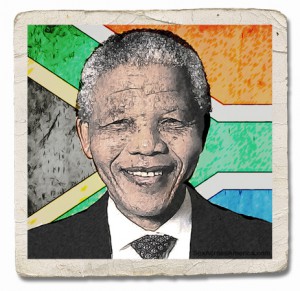 (12/16/13) The world has lost a giant. More importantly, the world has lost a friend.
(12/16/13) The world has lost a giant. More importantly, the world has lost a friend.
Nelson Mandela was laid to rest yesterday, but his legacy lives on brighter than ever. Though known mostly for his triumphs in civil rights and social justice, his sphere of influence–and inspiration–on a multitude of other issues reached so much further. Among these was his steadfast commitment to expanding global HIV/AIDS awareness and championing substantial prevention strategies. As we’ve listened to and read many of the recent poignant tributes in his honor over the past week, we’ve noticed a distinct absence of coverage regarding his efforts in this area. Accordingly, we would like to offer our thoughts with a bit of focus on what’s been missing.
With all of the emphasis on Mandela’s courageous battles against injustice and his hard-fought victories in transforming a nation, it’s easy to understand why some aspects of his leadership might be overshadowed, but it should never be said that any of these are subordinated because they were somehow less important. Indeed, though hardly ever the headline, Mandela made it a priority to voice his concern about HIV/AIDS and take direct action where he could. Joining alongside other high-impact organizations such as the Bill and Melinda Gates Foundation and Philip Harvey’s DKT International, the Nelson Mandela Foundation was formed specifically with the mission to promote HIV/AIDS awareness and prevention campaigns. Though one might think that he would have centered his efforts specifically on his native South Africa where, according to the United Nations, there are more than 2 million orphans due to the disease, he made it a point to leverage his global statesmanship as broadly as possible, particularly in the years following his presidency. As a direct result of these efforts and partnerships, along with inspiring other organizations worldwide, the number of new AIDS cases dropped by about 1/3rd over the past decade. With an infected population of over 35 million people globally, obviously there is still a lot of work to be done, but at least there is a glimmer of positive progress.
A glimmer, but progress nonetheless. Throughout his remarkable life, Nelson Mandela proved that every little thing adds up. A key lesson that he left us with is that no problem is insurmountable if everyone does something, even if small, to make humanity better. So, although the world is now a lesser place without his presence, we hope that many will honor his memory by becoming active in organizations such as those noted above and supporting their efforts in whatever ways possible. Through such action, even if small, you’ll be helping to ensure that his legacy becomes even brighter–and you’ll be making the world a better place.
